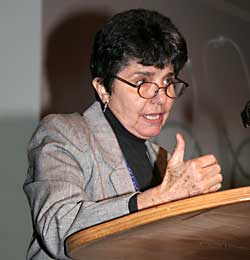
Just days after announcing a crackdown on researchers who do not disclose drug company ties, the editor of a prestigious medical journal says she was misled again — this time by the authors of a study linking severe migraines to heart attacks in women.
All six of the study's authors have done consulting work or received research funding from makers of treatments for migraines or heart-related problems. Their research appears in Wednesday's Journal of the American Medical Association , a week after the crackdown was announced.
The authors said they did not report their financial ties because they did not believe they were relevant to the study.
Dr. Catherine DeAngelis, JAMA's editor in chief, said journal editors did not know about the ties until The Associated Press brought them to her attention late last week.
"We'll get killed," she said, referring to the potential damage to the journal's reputation.
She said she would have published the authors' associations with drug makers had she known about them. "Let me decide what's pertinent or not," DeAngelis said. "The issue is not what can those companies possibly gain; it is the issue of perception."
Last week, JAMA disclosed that the authors of a depression study failed to report ties to makers of antidepressants. And two months ago, the journal reported similar omissions from authors of a study linking certain arthritis drugs to cancer.
JAMA has long required researchers whose articles it will publish to sign statements disclosing all potential financial conflicts. An editorial last week said JAMA was getting tougher as a result of the recent breaches. JAMA's new policy, effective in January, requires disclosures even before articles are accepted for publication.
Other leading medical journals, including the
New England Journal of Medicine, JAMA's main competitor, have disclosure requirements, but DeAngelis said hers are the toughest. Editors say disclosures are necessary to help readers judge the reliability of research.
JAMA posted a letter online Tuesday from the authors explaining the omissions, DeAngelis' response and a correction. DeAngelis said they would also be published in an upcoming print edition of the journal.
"Authors should always err on the side of full disclosure," she wrote in her response.
Dr. Tobias Kurth, the study's lead author, said the researchers were not trying to mislead the journal. He said they believed their financial ties were irrelevant because the study does not promote drug treatment, but rather reports a potential link between women with severe migraines and an increased risk of heart attacks.
"They do not represent a conflict of interest," he said in a telephone interview.
Kurth, a scientist at Harvard's Brigham and Women's Hospital, said he has received research funding from the makers of Bayer aspirin, Tylenol and Advil — pain relievers sometimes used to treat migraines.
Co-author Nancy Cook said in an e-mail that she received "minor compensation" for a one-time consulting stint for Bayer, but that she did not think it was relevant to her work on the migraine study.
"I do believe that conflicts sometimes exist and should be disclosed, but I hope this issue does not get overblown by the media," Cook said. "I think that could harm the reputations of honest and well-meaning researchers and lead to public mistrust where none is warranted."
Dr. Frederick Freitag, a Chicago migraine specialist not involved in the study, said the ties should have been reported, even if they had no effect on the research.
"You still owe it as a matter of appropriate disclosure to lay your cards on the table" or risk having somebody ask, "What are you hiding?" he said.
Freitag said he has ties with numerous drug companies because they fund important research.
Dr. Jerome Kassirer, a former New England Journal editor and outspoken critic of drug company influence over doctors, said JAMA editors appear not to have done their homework. "It sounds like they're being sloppy," he said.
DeAngelis said that the criticism is unfair, and that JAMA lacks the manpower to check every researcher's background. "I'm not God and I'm not the FBI ," she said.
She said the publicity probably will make others who haven't disclosed potential conflicts reconsider.
"I suspect we are going to have a whole bunch of disclosures over the next few weeks because authors are going to see how dead serious we are," DeAngelis said.
Source: LINDSEY TANNER, AP Medical Writer
No comments:
Post a Comment